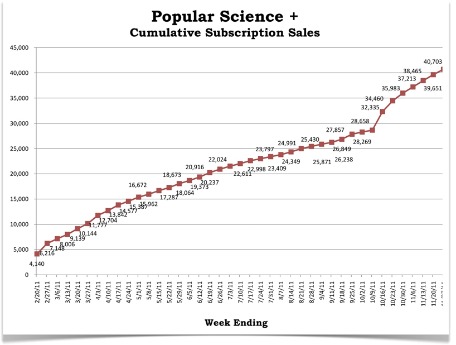How much has Apple’s Newsstand increased sales of magazine apps. It’s hard to say, but Peter Kafka posts a chart showing Popular Science, at least, has clearly benefited:
That spike toward the end coincides with the launch of Newsstand, which looks to have sent Popular Science app subscriptions roughly a quarter to a third above the trendline. As it stands, the magazine has more than 40,000 digital-app subscribers.
— Jeff Jarvis proposes a reverse paywall for The New York Times, where the site’s heaviest readers would earn credits for visiting it instead of “taxing — and perhaps turning away — the valuable users.” That sounds fine to me, if a bit pie in the sky, but the idea that papers shouldn’t want to charge your heaviest users is a bad one.
While The New York Times paywall is an unqualified success, adding (in the first four months or so) about 424,000 to the paper’s paid circulation and more than $60 million in new revenue (by my rough estimate), all while keeping digital ad revenues flowing, Mathew Ingram says, for instance, “paywalls feel wrong because they penalize a site’s most loyal readers.”
Say I’m one of my local taco stand’s most-loyal customers. I suppose I should be offended that they’re “taxing” me and “penalizing” me by charging me because I pay more for eating their food three times a week than someone who pops in twice a year?
Yes, the marginal costs of distributing an additional copy of The New York Times are virtually nil, while the marginal costs of making another taco are high. But production costs matter too. If you’re only collecting $4 for a taco plate that costs you $5 to produce, then you have to raise prices or cut costs. If you’ve already cut labor costs to the bone, and the next round would start bringing you down toward Taco Bell-type quality, you’d better start charging for that extra dollop of guacamole or salsa.
(Adding) I forgot to note the anti-paywall Steve Buttry’s prediction:
I will re-offer last year’s predictions, since they largely didn’t happen in 2011…
At least one high-profile news organization will drop its paywall.
That surely won’t happen, but even if it does, many more news organizations will be adding leaky paywalls in 2012 than dropping them. The only question for them is how leaky to make the paywall in order to optimize revenue.
— The Wall Street Journal‘s Jessica Silver-Greenberg follows up on her excellent report on debt collectors harassing spouses and relatives of dead debtors.
She reports that Capital One has engaged in aggressive and illegal collection practices, going after debts that have already been discharged in bankruptcy.
It wasn’t the first time the company went after its customers for debts that had been snuffed out in bankruptcy, even though the practice is illegal. A court-appointed auditor concluded earlier this year that Capital One pursued 15,500 “erroneous claims” seeking money previously erased by a bankruptcy-court judge.
More than 800 of those borrowers have filed lawsuits or other legal actions against Capital One, the auditor said in a Dec. 6 court filing…
Debt collection is a major component of Capital One’s business that gets little attention from analysts and investors. As of Sept. 30, Capital One had $2.7 billion in net income so far this year on revenue of $12.22 billion, but it also was forced to write off $2.9 billion in uncollectible loans.
Very, very interesting.
— The Audit will be back on January 4.
Happy Holidays to Bill O’Reilly and Merry Christmas, Happy Hanukkah, and Happy New Year, etc., to everybody else.
Ryan Chittum is a former Wall Street Journal reporter, and deputy editor of The Audit, CJR’s business section. If you see notable business journalism, give him a heads-up at rc2538@columbia.edu. Follow him on Twitter at @ryanchittum.

